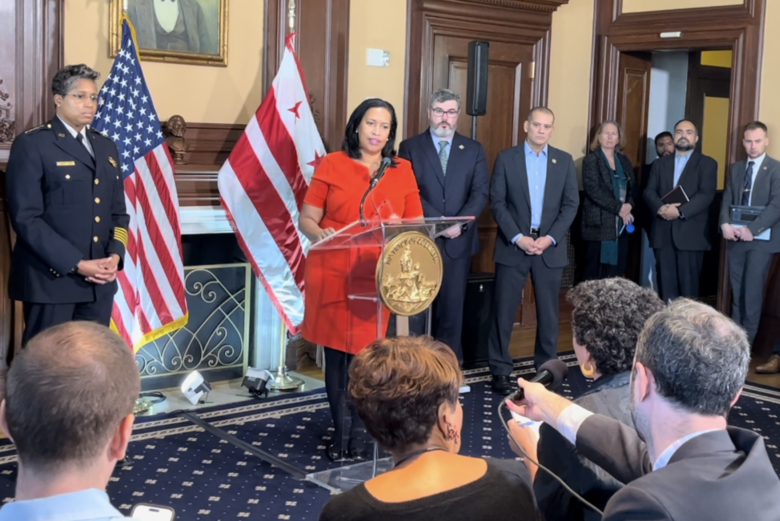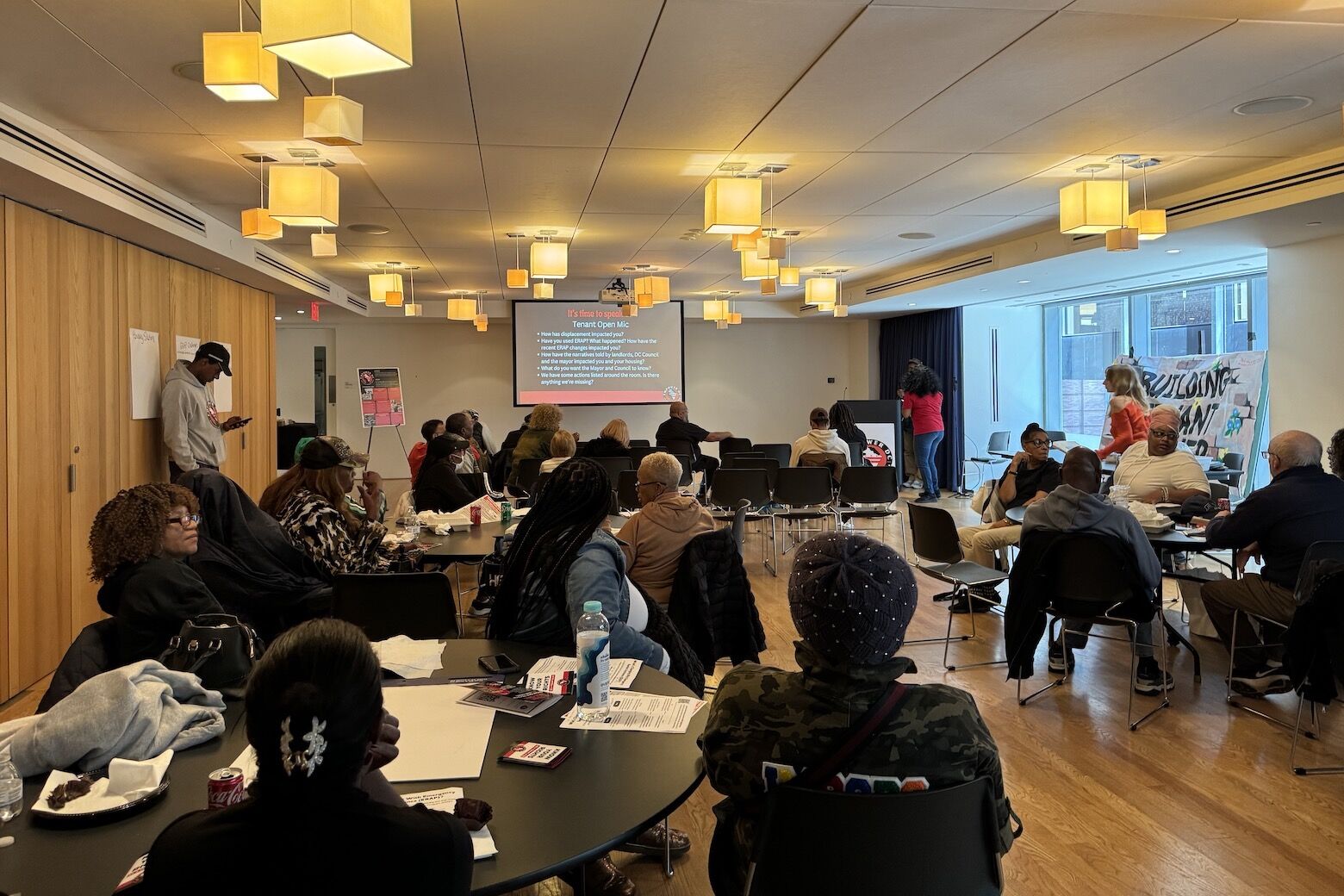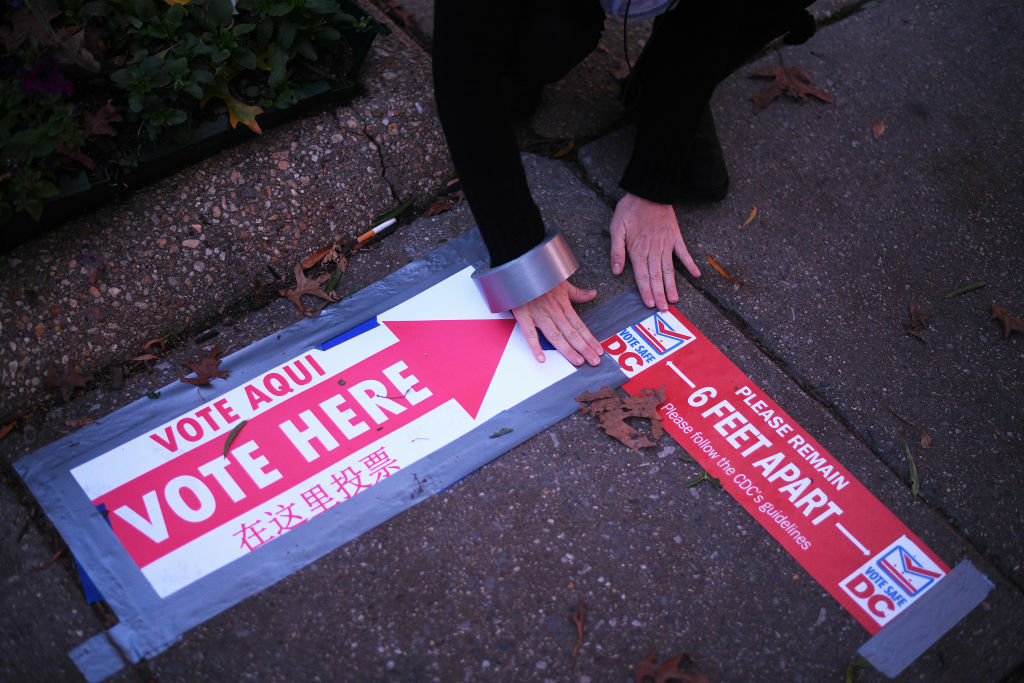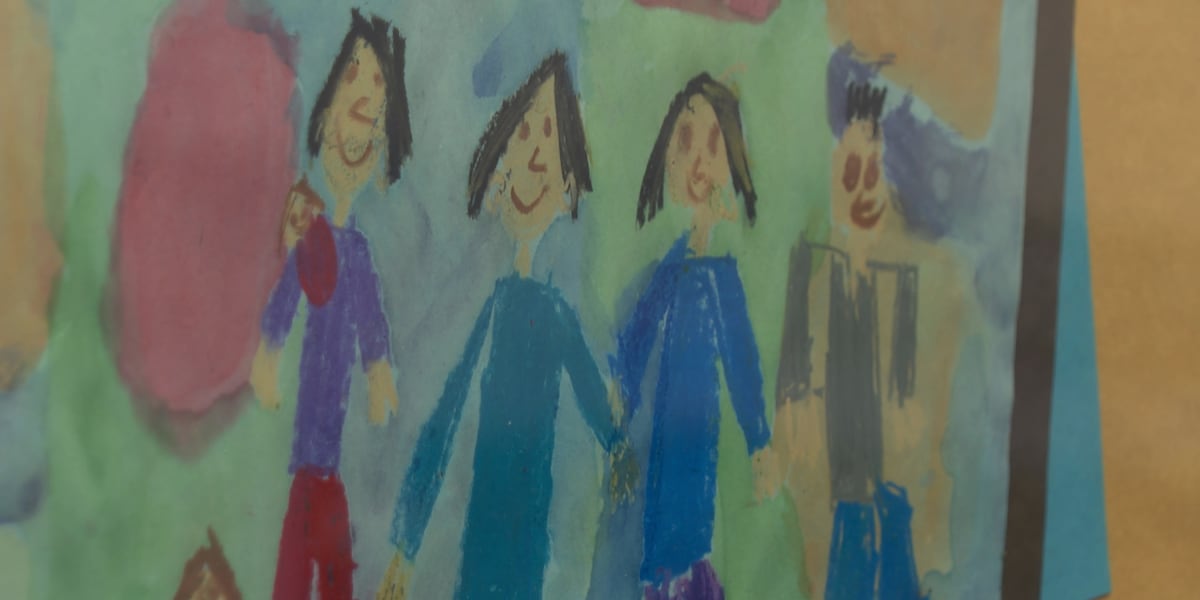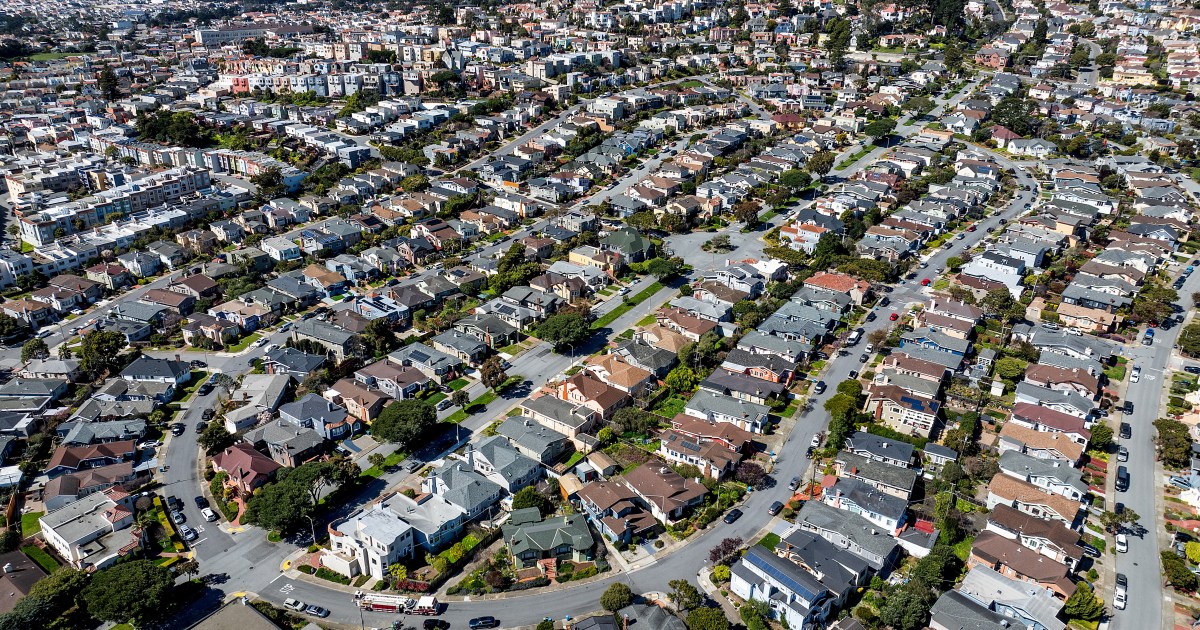Washington, D.C
DC police chief speaks on ‘hope beyond circumstances’ at holiday party for foster families – WTOP News
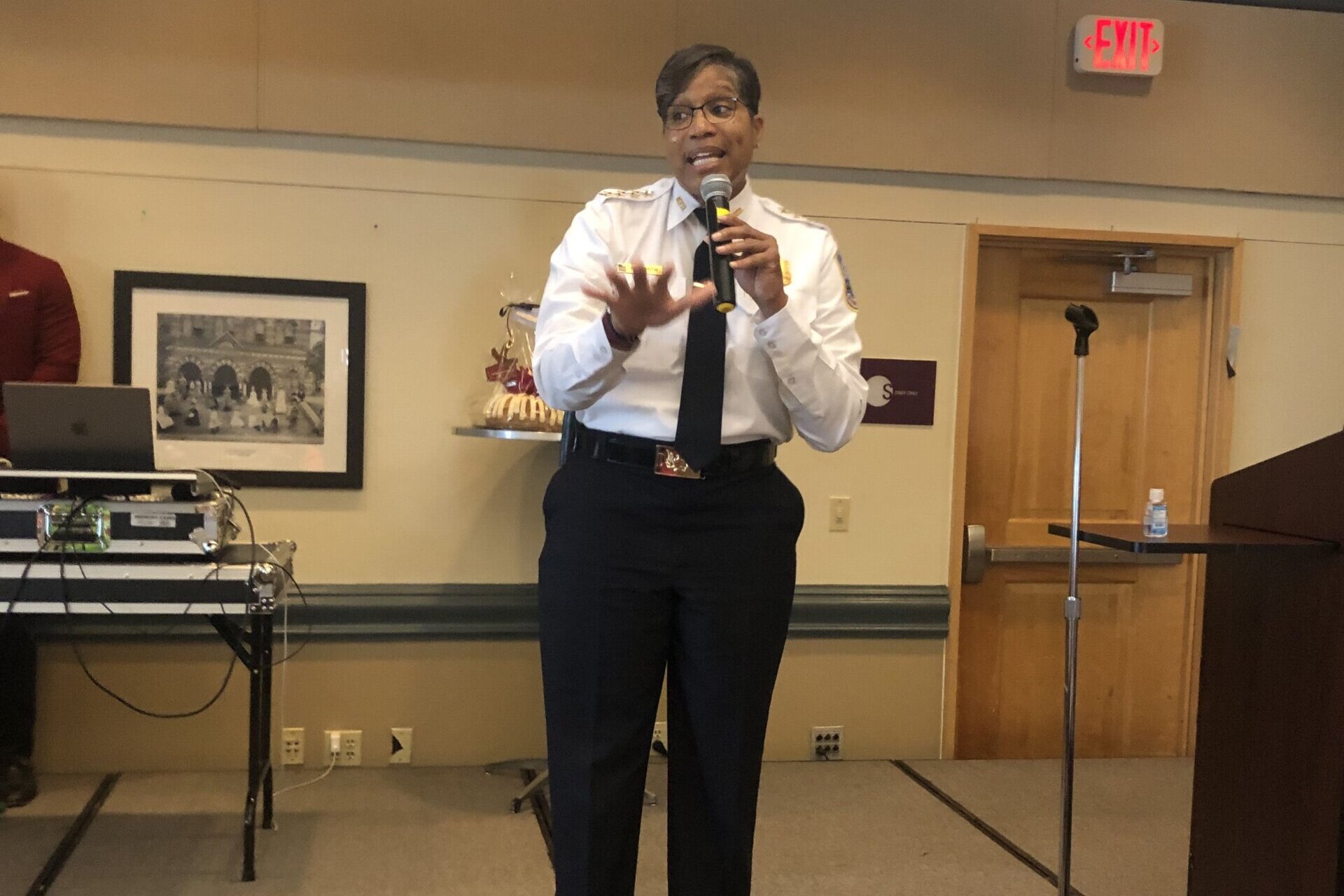
More than 300 children in foster care in D.C. celebrated the season with family members at a holiday party hosted by the Foster and Adoptive Parent Advocacy Center on Saturday.
(WTOP/Dick Uliano)
WTOP/Dick Uliano
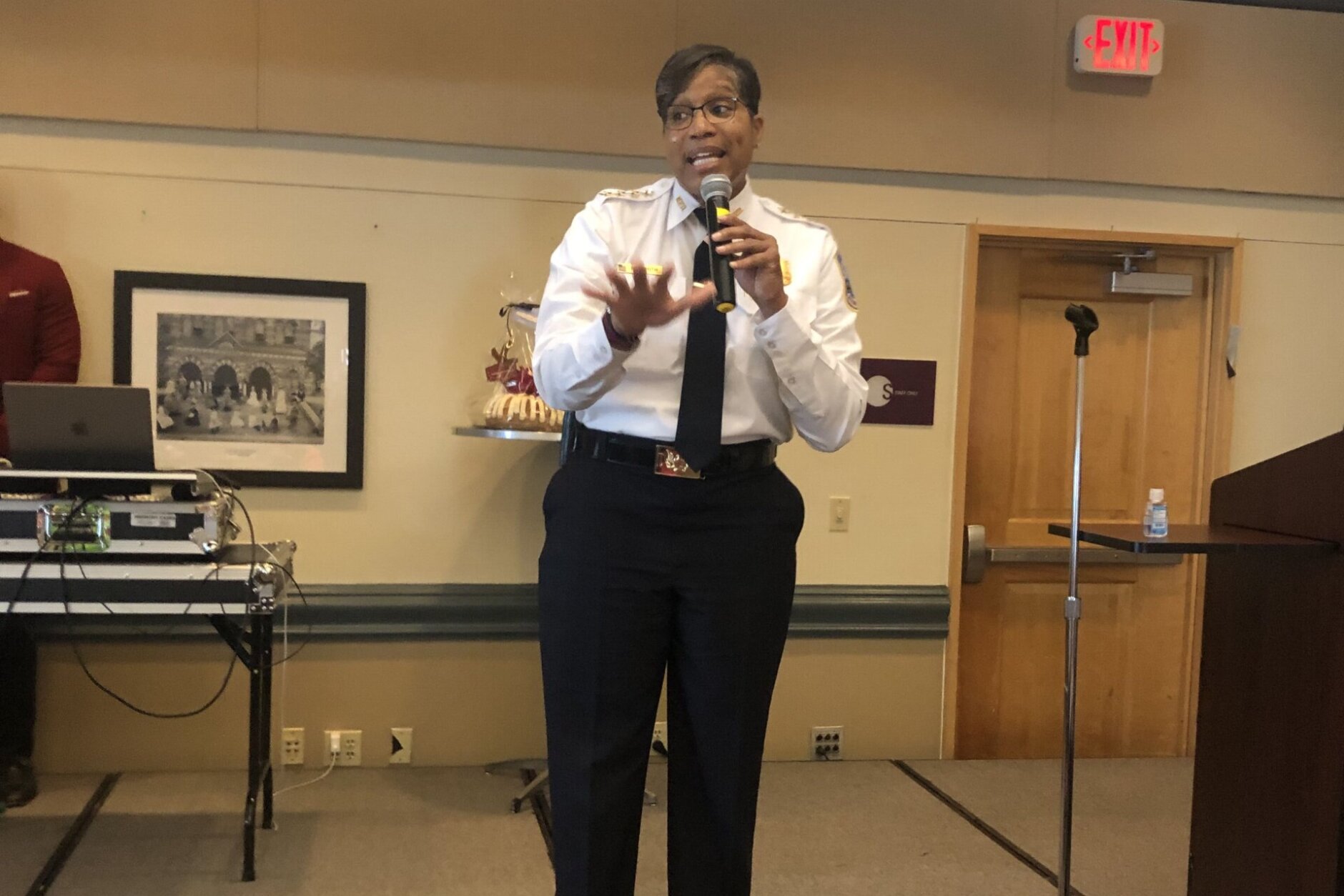
(WTOP/Dick Uliano)
WTOP/Dick Uliano
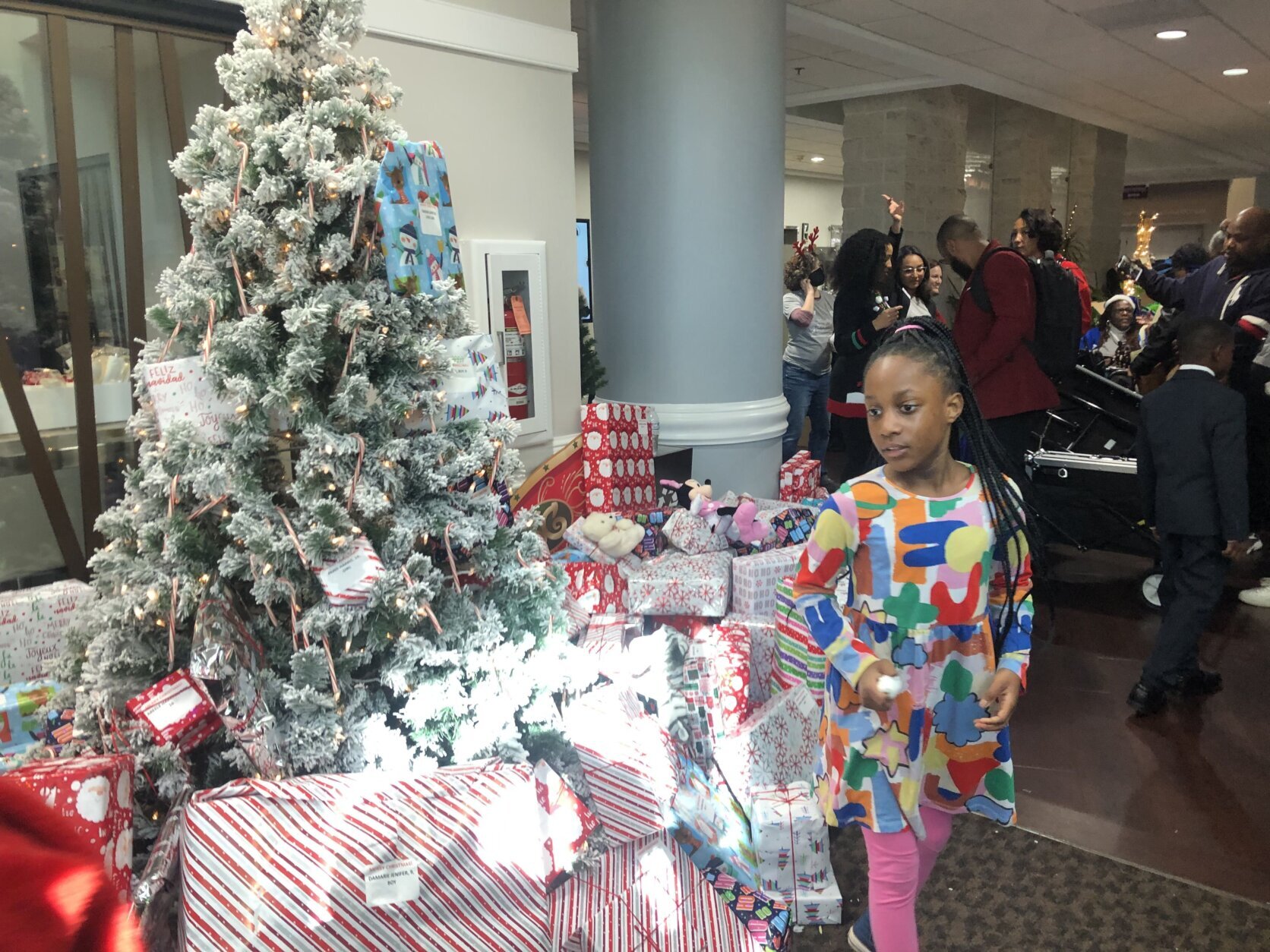
(WTOP/Dick Uliano)
WTOP/Dick Uliano
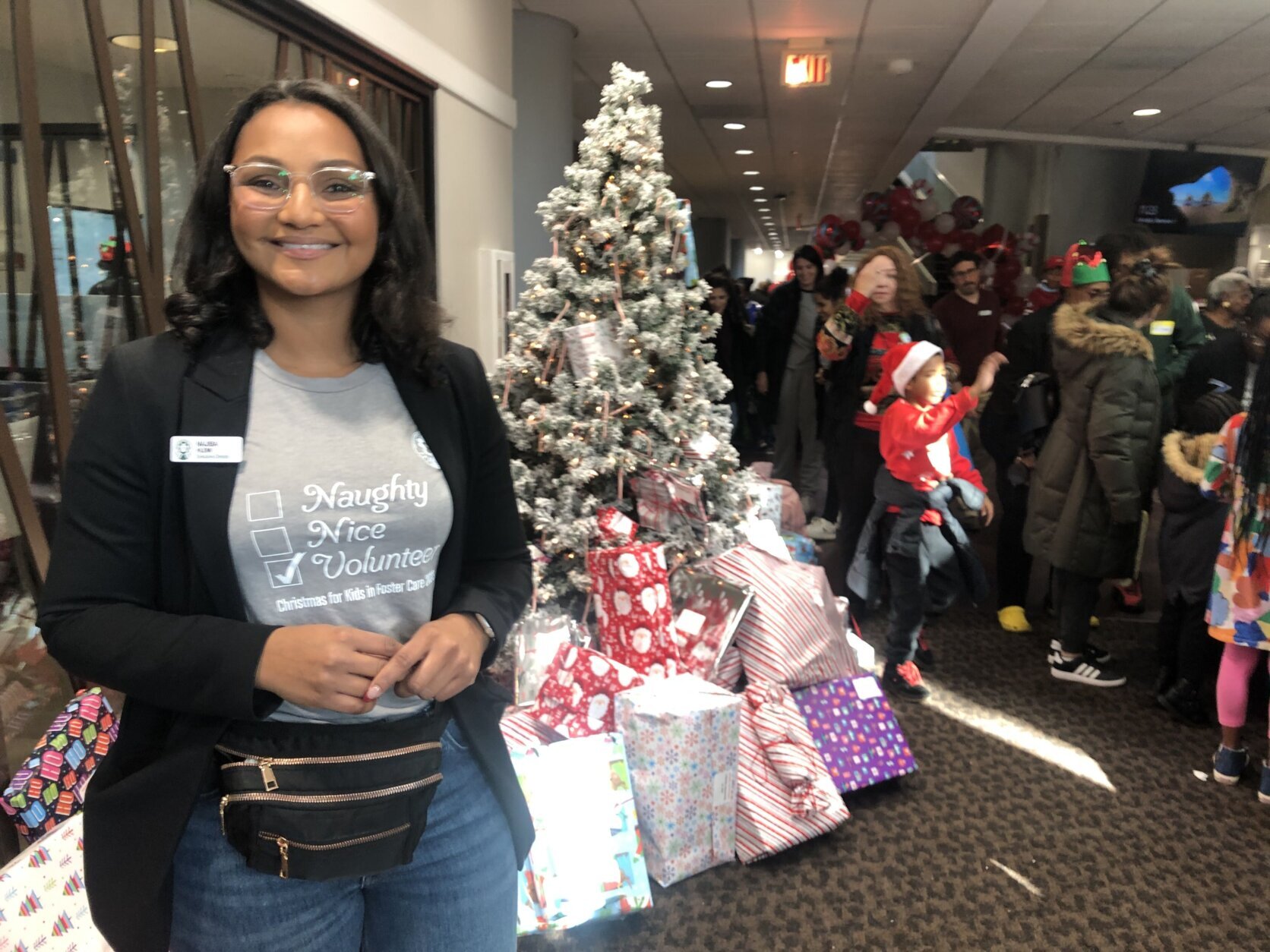
(WTOP/Dick Uliano)
WTOP/Dick Uliano
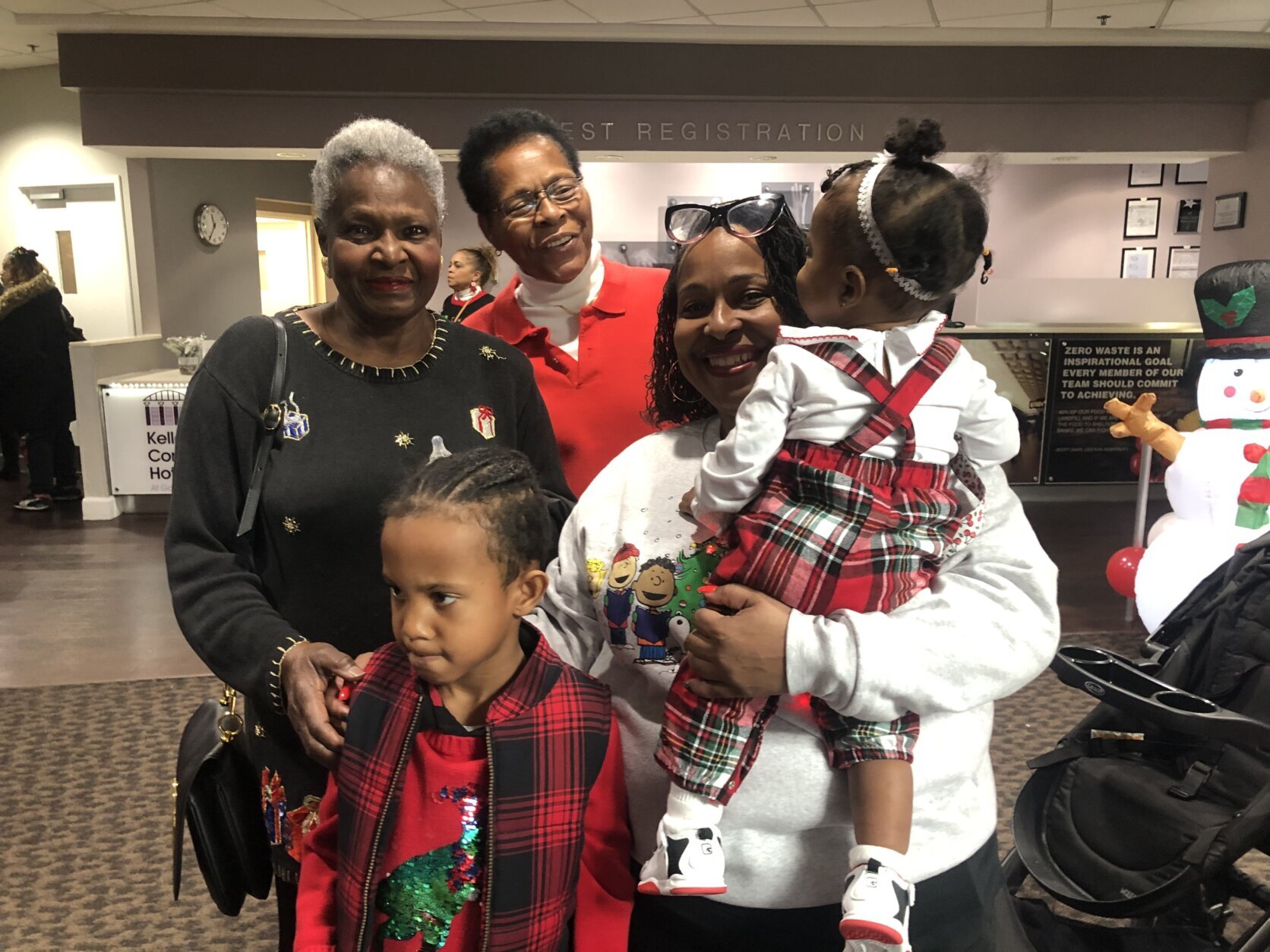
(WTOP/Dick Uliano)
WTOP/Dick Uliano
More than 300 children in foster care in D.C. celebrated the season with family members at a holiday party hosted by the Foster and Adoptive Parent Advocacy Center on Saturday.
There, they heard the voice of wisdom and experience from D.C. Police Chief Pamela Smith, who spent time in foster care as a child in Pine Bluff, Arkansas.
The party, held in the Kellogg Conference Center on the campus of Gallaudet University, was seasonally decorated for the special luncheon featuring music and games. More than 50 volunteers oversaw the festivities, including collecting and wrapping the hundreds of gifts for kids, heaped under a Christmas tree.
“We try to bring foster families and their children that were separated from their birth families and their siblings, to meet with their birth families,” said Najiba Hlemi, executive director of the Foster and Adoptive Parent Advocacy Center. “So they can have a joyful memory of Christmas.”
Smith told the children that she hoped her life in foster care would give them hope.
“Even in the space of being in foster care, I had a family that adopted me, a pastor and his wife who saw something … in me that I couldn’t see in myself,” Smith said.
“It’s my hope that my story will encourage some young woman, young boy, young girl to keep on fighting the good fight and to stay encouraged and know there’s hope beyond their circumstances today.”
The chief went on to say that she was a child of teenage parents who divorced and struggled with substance abuse.
She said she was fostered and later adopted by a pastor and his wife with five daughters, making her the sixth. The chief said she eventually reconciled with and forgave her birth mom.
Among the foster parents were young families, as well as families with plenty of fostering experience.
“I got him when he was 18 months old, and he’s now 7 years old,” said Carolyn Woods, a foster mom speaking about her son.
“It’s been a joy for me. A lot of times people look at it like we’re the blessing to the children, but that’s not always true, they’re a blessing to us.”

Washington, D.C
Mayor Bowser, Commanders' Josh Harris, and other local leaders react to RFK Stadium deal
WASHINGTON (7News) — After years of debate, false starts, and controversy, the Robert F. Kennedy Memorial Stadium Campus Revitalization Act was passed in the Senate with unanimous consent, paving the way for the Washington Commanders to return to D.C.
Now, local leaders are speaking about the benefits, and potential drawbacks, of a new football stadium in the city.
Congresswoman Eleanor Holmes Norton (D-DC)
D.C. has scored a victory in its fight for self-determination just in time for the holidays. When the bill is signed into law by President Biden, D.C. will get to decide for itself what to do with the largest unused tract of land remaining in the District. I look forward to seeing the site transformed from crumbling blight to a productive and bustling complex that will generate significant revenue for the nation’s capital.
Throughout my career in Congress, I’ve prioritized transferring unused federal land to D.C. or the private sector, enabling the redevelopment of neighborhoods, generating tax revenue and bringing much-needed space to the District.
Maryland U.S. Senators Ben Cardin and Chris Van Hollen
Maryland has been the proud home of the Commanders for over two decades and we continue to believe that this partnership should continue long into the future. After working to level the financial playing field, and receiving assurances that should the team move they will redevelop the existing site in a manner that meets the needs of the community, tonight we supported the proposed land transfer legislation. We have always supported the District’s effort to control its own land, and through regional discussions and cooperation, our concerns with this proposal have been addressed.
DC Mayor Muriel Bowser
Josh Harris, Managing Partner of the Washington Commanders
We are extremely grateful that our elected officials have come together on a bipartisan basis to give Washington D.C. the opportunity to decide on the future of the RFK stadium site. This bill will create an equal playing field so that all potential future locations for the home of the Washington Commanders can be fairly considered and give our franchise the opportunity to provide the best experience for all of our fans.
Congressman Glenn Ivey (D-Md)
Maryland should have the chance to compete to keep the Commanders here.
I opposed this bill in the House, and I oppose it today, because federal taxpayers should not be required to subsidize an NFL stadium by offering a 99-year lease of the RFK campus for free. That’s not fair to the taxpayers, and it’s not fair to Maryland because it undermines Maryland’s chance to compete on a level playing field.
But we can still win. Our site offers two nearby Metro stations, superior highway access, and a larger campus for parking. Now that the Dan Snyder era is over and the Harris team has brought winning football back to the DMV, a state-of-the-art indoor stadium would jumpstart redevelopment in the area and trigger property appreciation in short order. In addition to the ten games or so the Commanders play, the stadium could be used year-round for events like the Final Four and music concerts. Working closely with the Harris team–which owns much of the land around the stadium–we could create an economic win-win that would benefit the community, the region, the team, and the fans.
Maryland looks forward to working with the Harris team to make that vision a reality.
DC Councilmember Kenyan McDuffie
DC Council Chairman Phil Mendelson
We are grateful the legislation passed and that this large tract will not continue to deteriorate with a crumbling stadium on it.
At the same time, it is unfortunate that the Senate found unanimous consent to move the legislation concerning RFK, but is leaving untouched ten judicial vacancies. This continues to be a setback to the District’s public safety ecosystem. I would also be remiss to not emphasize that the continuing resolution underfunds, our police by $10 million.
Washington, D.C
LIST: Free, engaging options in DC for your kids, families during Winter break

WASHINGTON, D.C. (7News) — Mayor Muriel Bowser, along with the Department of Parks and Recreation (DPR), is offering dozens of activities for kids and families during the 2024-2025 Winter break.
“These initiatives provide young people with safe and engaging activities from Dec. 21 through Dec. 31. While many events are designed for all age groups, DPR is also hosting specialized programming for teenagers, creating dedicated spaces for them to connect, socialize, and have fun,” the Mayor said in a press release.
READ MORE | Man killed in Walker Mill shooting, marks 100th murder in Prince George’s County this year
Here are a list of the activities:
Community Toy Giveaway: Toy distribution and cocoa for children in the community
- When: Saturday, Dec. 21, 9 a.m. – 12 p.m.
- Where: Fort Stevens Recreation Center, 1327 Van Buren Street, NW
Movie Field Trip: Sonic 3: Young people can enjoy a field trip to see Sonic 3, with multiple pickup locations
- When: Saturday, Dec. 21, 10 a.m. – 3 p.m.
- Register HERE
Grinchmas at Kenilworth: Join us for a community holiday Grinch-themed party
- When: Saturday, Dec. 21, 10 a.m. – 1 p.m.
- Where: Kenilworth Recreation Center, 4321 Ord Street, NE
Community Christmas Extravaganza: An event for the distribution of toys, hygiene products, coats, and used clothing to those in need
- When: Saturday, Dec. 21, 10 a.m. – 4 p.m.
- Where: Rosedale Community Center, 1701 Gales Street, NE
Holiday Hype: A festive gathering at the MLK Library for all ages
- When: Saturday, Dec. 21, 2 p.m. – 6 p.m.
- Where: MLK Library, 901 G Street NW
- Register HERE
SEE ALSO | Crews, carjackings and youth crime: 7News speaks with US Attorney Matthew Graves
Just Cares Toys for Tots Youth Basketball Tournament: This holiday basketball tournament and charity event will include Santa picture booth, entertainment, toy giveaways, and adult and kids basketball games!
- When: Sunday, Dec. 22, 9 a.m. – 5 p.m.
- Where: Deanwood Community Center, 1350 49th Street, NE
Water Cycle and Aqua Fitness: Water-based activities and fitness sessions
- Where: Ferebee-Hope Aquatic Center, 700 Yuma Street SE
- Water Cycle: Dec. 24 and 26, 3 p.m. – 3:45 p.m.
- Aqua Fitness: Dec. 24 and 26, 6 p.m. – 6:45 p.m.
eSports and Gaming Tournaments
- eSports Throwback & Brawlhalla Tournament: Columbia Heights Community Center, Dec. 23, 11 a.m. – 3 p.m.
- eSports 2K24 Tournament: Turkey Thicket Recreation Center, Dec. 26, 11 a.m. – 3 p.m.
- Winter E-Gaming Tournament: Hillcrest Recreation Center, Dec. 27, 2 p.m. – 6 p.m.
- eSports Madden Tournament: Deanwood Community Center, Dec. 27, 11 a.m. – 3 p.m.
Holiday Drip: Celebrate the season with music and water-based fun
- When: Dec. 27, 3 p.m. – 5 p.m.
- Where: Barry Farm Aquatic Center, 1230 Sumner Road SE
Holiday Sing-Along: Come out to sing your favorite holiday carols
- When: Monday, Dec. 30, 3 p.m. – 5 p.m.
- Where: Kennedy Recreation Center, 1401 7th Street, NW
Holiday Movie Night: Come out to the Joseph Cole Recreation Center for a holiday movie
- Where: Joseph Cole Recreation Center, 1299 Neal Street, NE
- When: Monday, Dec. 23 and Dec. 30, 4 p.m. – 6 p.m.
Teen Time: Teens will have the chance to play minute-to-win-it games, board games, art activities, and basketball!
- When: Friday, Dec. 27, 5 p.m. – 6 p.m.
- Where: Ridge Road Community Center, 830 Ridge Road, SE,
Teen Time: Teens will have the chance to play minute-to-win games, board games, art activities, and basketball!
- When: Monday, Dec. 23, Tuesday, Dec. 24, Monday, Dec. 30, and Tuesday, Dec. 31, 5 p.m. – 6 p.m.
- Where: Rosedale Community Center, 1701 Gales Street, NE
High School Lifeguard Training: Comprehensive lifeguard training for high school students at multiple locations
- Ballou HS Aquatic Center, 3401 4th Street SE: Dec. 22 – 24, 10 a.m. – 6 p.m.
- Dunbar HS Aquatic Center, 101 N Street NW: Dec. 26 – 28, 10 a.m. – 6 p.m.
- Roosevelt HS Aquatic Center, 4301 13th Street NW: Dec. 29 – 31, 10 a.m. – 6 p.m.
- Rumsey Aquatic Center, 635 North Carolina Avenue SE: Dec. 29 – 31, 10 a.m. – 6 p.m.
Junior Lifeguard Academy: A training program for youth ages 9 to 15 interested in lifeguarding, with sessions offered at various aquatic centers
- When: Dec. 23 through 31
- Locations:
- Barry Farm Aquatic Center, 1230 Sumner Road SE: 2 p.m. – 3 p.m.
- Turkey Thicket Aquatic Center, 1100 Michigan Avenue NE: 2 p.m. – 3 p.m.
- Ferebee-Hope Aquatic Center, 700 Yuma Street SE: 12 p.m. – 1 p.m.
- Deanwood Aquatic Center, 1350 49th Street NE: 12 p.m. – 1 p.m.
- Takoma Aquatic Center, 300 Van Buren Street NW: 12 p.m. – 1 p.m.
- Reservoir Park Aquatic Center, 10 Lower Service Court NW: 1 p.m. – 2 p.m.
Washington, D.C
An 'Ode to the Women in D.C': 'THROUGHLINE VOL. II' Honors Local Changemakers With Multidisciplinary Art Exhibit

If a picture is worth a thousand words, how much would it amount to when fused with original poetry, vibrant artwork, and themed cuisine?
California natives Xavier Renard Cunningham and Taylor Smalls offer insight to this question in Northwest D.C., with “THROUGHLINE: VOLUME II (VOL. II),” an exclusive multisensory art exhibition that leverages photography, painting, performance art, and culinary craft to champion 16 of the District’s Black unsung heroines.
“[‘THROUGHLINE’] was always about, how do we celebrate something, and how do you do that through art,” said Cunningham, creative producer of “THROUGHLINE.” “The cheeky answer is, why not Black women, who are – for us – the foundation, not only of what runs our [cities], but we think the world.”
Through Dec. 22, art connoisseurs can indulge in an immersive experience of culture and ambiguity, as Autoshop at Union Market hosts “THROUGHLINE’S” second iteration and first-ever in D.C.
The interdisciplinary exhibit combines poetry, music, and visual and culinary art to honor the breadth of women trailblazers across various platforms, from education and activism to entrepreneurship and wellness.
“[This] was created deeply starting with that fundamental purpose of unearthing those change makers, those change agents who are sometimes and more often than not, uncelebrated … even though they are shifting and shaping culture as we know in every city,” Cunningham explained.
District honorees such as Ashley Etienne and Alencia Johnson have fearlessly shaped the local political landscape, while other heavy-hitters like Kelsye Adams, Sister Mary Brown and Chloe Dulce Louvouezo — the latter two present for a “VOL. II” display on Dec. 15 — redefine social narratives and advocate for underserved groups locally and nationally.
Other celebrated recipients include: Ayo Tometi; Dionna Dorsey; Christine Platt; Rhea Combs; and Carla L. Sims, to name a few.
“Too often, we walk through this life doing extraordinary things, but going unseen,” Etienne, who was also in attendance on Sunday, told The Informer. “So to be seen and then to have it … for people like my daughter and others to see it and to admire the beauty, the essence and the work of Black women is just incredible.”
Imitation: The Sincerest Form of Flattery
Dozens of spectators gathered on Dec. 15 to witness the virtuosity and impact of “THROUGHLINE VOL. II,” which features breakout artists: Adedayo Kosoko (photographer); Gabrielle Hights (musician); Smalls (painter); as well as Chef Keem Hughley of Bronze DC, and award-winning poet Michael Wayne Turner III.
The collaborative exhibit is a powerful demonstration of nesting beauty in the eye of the beholder, with two levels of subject-based illustrations and individualized food dishes contingent on artistic ambiguity and perception.
As the lamented poetry explores themes of introspection and endurance, the visuals emulate the honorees’ pride and potency; Meanwhile, Chef Hughley’s paired custom entrees provide flavor to the textures and colors of the distinct images, culminating in a celebration for all the senses.
“Sitting with each of these women, taking time to really respect who they are, what they have come to be and how they stand in this exact moment … this is an ode. It’s a love letter to the women in D.C.,” said Smalls.
Turner brought the stilled images and deep-colored portraits to life as the classically trained thespian led guests on a theatrical tour through Autoshop — his voice commanding the room with a spiritual cadence as he recited each of his poems to the soulful refrain:“Maybe, you’ll join me down by the river, so I may wash away all of my pride.”
Darlene Brown, CEO of Divine Empowerment, appreciated the reflective aspect of the interdisciplinary exhibition, which she described as: “cathartic,” “inspirational,” and “a catapult” to empowerment.
“As I walked through, reading the poetry, examining the photos, the entire experience, I felt seen as a Black woman in America,” Brown told The Informer. “I felt validated, I felt heard, I felt valued … in a way that I can’t say that I’ve ever experienced coming to [an] exhibit [for] art and poetry.”
According to Smalls, who crafted all 18 paintings in the exhibit, the collaborative approach of artistic practices serves as what she calls a throughline to creatively “pass the baton” of culture preservation and diasporic solidarity.
The Oakland-based painter boasted one particular example: “Young Saffron,” a canvas painting of local entrepreneur and honoree Angel Gregorio with a saffron-colored base.
Since Gregorio travels internationally, particularly to Africa, to collect unique spices, Hughley made her personal dish a wagyu hot dog topped with Mambo Sauce — a D.C. speciality — and infused it with saffron spices from her spice boutique, The Spice Suite, located in the city’s Langdon Park community.
“It’s this really beautiful storytelling working together on so many different levels of artistry, but also across the diaspora … to hold what we know culturally, and specifically, in this city,” Smalls told The Informer.
But, the power of artistic exploration shone beyond connections to D.C. culture.
For Felicia Allen, a Florida-based grief counselor who flew to D.C. for the Dec. 15 showcase, the artists proved to encapsulate not only the spirit of the champions on the walls, but the resilience of Black women throughout African American history.
“This show is a culmination of who [Black women] are as people. Our strength, our intellect, our creativity, our innovation,” Allen told The Informer. “There is truth in these writings, in these pictures. We know who we are and what we’ve done, and this is a space of empowerment.”
Championing Prosperity, Representation Through the Arts
The shared project upholds a deeper purpose of centering what Cunningham considers “the core and foundation” of the Black community: mutual support and collaboration.
“[‘THROUGHLINE’] is about fighting against that notion that everything we do must be in silence, that we must pull ourselves up by our own bootstraps,” said Cunningham. “We truly believe it’s through community that you get ahead, that each person in this room has their own throughlines and connective tissue that can unlock their deepest dream.”
In addition to championing local changemaking, creative spaces like “THROUGHLINE” act to preserve the future of cultural arts–an industry where Black people are disproportionately outnumbered.
Data from a Burns Halperin Report shows that between 2008 and 2020, Black American artists only represented approximately 2% of museum acquisitions and 6% of exhibits, despite Black Americans making up 13.6% of the entire United States population.
With the methodic integration of various modalities, Allen said “THROUGHLINE” underscores the value of diversity in the arts and opens doors that could catapult creativity and innovation.
“We speak through the arts. [It’s] deeply rooted in our culture…[and] opens up that venue for us to be demonstrative, to have exploration and teach at the same time,” she explained. “I think now more than ever, that’s what we need.”
As “THROUGHLINE VOL. III” prepares to host its third installation in Detroit, Michigan, honoree Etienne commends the institute’s commitment to Black women inclusion, emphasizing the gravity of uplifting vulnerable communities–especially given recent political cycles.
“There are a lot of Black women that are feeling dejected, betrayed and undervalued after the election,” said the CBS News political contributor. “An exhibit like this that puts on display the finest of Black women and the humanity of Black women, I think, is not only timely, but it is priceless, and it is invaluable to our spirits right now.”
This story is part of the Digital Equity Local Voices Fellowship Lab. The Lab initiative is made possible with support from Comcast NBCUniversal.
-

 Politics1 week ago
Politics1 week agoCanadian premier threatens to cut off energy imports to US if Trump imposes tariff on country
-
/cdn.vox-cdn.com/uploads/chorus_asset/file/25789444/1258459915.jpg)
/cdn.vox-cdn.com/uploads/chorus_asset/file/25789444/1258459915.jpg) Technology1 week ago
Technology1 week agoOpenAI cofounder Ilya Sutskever says the way AI is built is about to change
-

 Politics1 week ago
Politics1 week agoU.S. Supreme Court will decide if oil industry may sue to block California's zero-emissions goal
-
/cdn.vox-cdn.com/uploads/chorus_asset/file/25546252/STK169_Mark_Zuckerburg_CVIRGINIA_D.jpg)
/cdn.vox-cdn.com/uploads/chorus_asset/file/25546252/STK169_Mark_Zuckerburg_CVIRGINIA_D.jpg) Technology1 week ago
Technology1 week agoMeta asks the US government to block OpenAI’s switch to a for-profit
-

 Politics1 week ago
Politics1 week agoConservative group debuts major ad buy in key senators' states as 'soft appeal' for Hegseth, Gabbard, Patel
-

 Business7 days ago
Business7 days agoFreddie Freeman's World Series walk-off grand slam baseball sells at auction for $1.56 million
-
/cdn.vox-cdn.com/uploads/chorus_asset/file/23951353/STK043_VRG_Illo_N_Barclay_3_Meta.jpg)
/cdn.vox-cdn.com/uploads/chorus_asset/file/23951353/STK043_VRG_Illo_N_Barclay_3_Meta.jpg) Technology7 days ago
Technology7 days agoMeta’s Instagram boss: who posted something matters more in the AI age
-
News1 week ago
East’s wintry mix could make travel dicey. And yes, that was a tornado in Calif.

